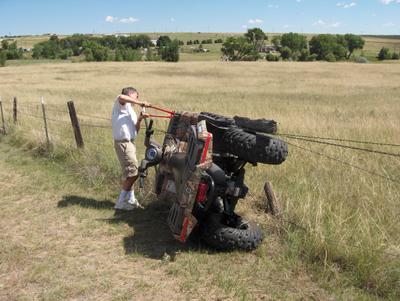
Two straight Colorado posts. After moving here a couple of years ago I guess I'm getting more at home in the nosebleed seats.
I don't normally do specifically political posts either, but we've got a debate here that's fascinating.
TABOR and Tax RevoltIn the early 90's Colorado voters approved the Tax Payers Bill of Rights (TABOR)which changed the state constitution. Tabor put strict spending limits on state government. Without going into all the details, TABOR limited state government from increasing its spending more than a formula keyed to inflation and recent tax revenues. Any tax revenues beyond the formula had to be returned to the tax payers.
It was part of a Colorado "tax revolt" and a conservative surge in politics here. The whole thing was a grandchild of Proposition 13 in California back in the 70's. Tax revolts are as American as the Boston Tea Party, so there was nothing particularly cutting edge about it except that it helped pioneer a new concept of 'constitutional' limits on spending. Previous attempts to limit spending tended to freeze property taxes (like Prop 13)or some other source of government revenues.
Personally, I think there's a lot to be said for restraining government spending and making sure the money goes to appropriate priorities. That's one of the best correctives the conservative movement brought to the table back in the 60's and 70's when those ideas were particularly innovative and progressive.
As a Coloradan I enjoy one of the lowest state tax rates in the United States. I also live in a state that ranks at the bottom of the country in social spending and 48th in spending on education.
When you solve one problem you create another. It's a universal law. So political and economic decision-making is all about what you value, in my mind. You can't have it all and choices have to be made.
As a result of all this Colorado has become a prototype for the current conservative dream of "shrinking government till it's small enough to drown in the bathtub" and relying on the private business community and private charity to run things effectively. We've been an ideological example for the nation with the very fiscally conservative Republican governor Bill Owens leading the way.
Unfortunately--at least from a conservative perspective--ideological paradise turned out to be pretty short lived.
Colorado hit a severe recession along with the rest of the nation in 2001 but didn't recover until this year. The past 4 years have been the biggest economic downturn in Colorado since the 1950's. We moved here right in the middle of it. My timing has always been impeccable.
The recession plus TABOR severely cut into state resources and Governor Owens--who originally led the way in passing TABOR--has been slashing spending in every way possible to try to make ends meet and comply with TABOR. Because of complicated
quirks in TABOR along with mandated spending based on state initiatives and federal mandates, Colorado has been forced to cut very large amounts of its budget out of higher education and infrastructure and health care for the uninsured poor, among many other important priorities.
Governor Owens and pretty much every responsible fiscal authority in the state recognized that TABOR was badly conceived because the drafters didn't think through how to respond to a severe economic downturn. The idea of restricting spending was good, but the scheme ended up crippling spending on things that most reasonable people consider essential.
So Owens and the Legislature drafted Referendums C and D as a corrective. Without getting into all the details, the two refs allow for a 5 year "time out" from TABOR and give the state authority to invest in the community college and university system, health care for the uninsured poor, highways and roads and many other priorities. Without that time out, Colorado would have to slash spending to levels that would likely leave the future basic infrastructure of the state crumbling and negatively effect future business investment and economic growth. The conservative Rocky Mountain News (one of the two main Denver papers)did an excellent 5 part series recently demonstrating in detail the severity of the potential cuts and damage.
It might sound at this point like a no brainer and that C and D would enjoy overwhelming support. But not so. The campaign over these two referendums has polarized the state and is drawing interest from all over the country.
Facts, Self-Interest and IdeologyThe supporters of Referendums C and D include:
Conservative Republican Governor Bill Owens and an 80% bipartisan vote in the legislature. The Republican and Democratic mayors and city councils of virtually every major city in Colorado. Virtually every major newspaper in Colorado. Every major Chamber of Commerce in Colorado. Every major school district and institution of higher education. The vast majority of the major corporations in Colorado. Fireman and police unions. And on and on. The list is remarkable in its length and diversity.
The opponents include:
Grass roots anti-government conservatives all over the state (financed by out of state anti-tax and government groups)
The latest polls:
Too close to callIf you have any sense of the dramatic, this whole election is pretty cool. I don't know if I've run across something like this before. It's not about personalities like most national or California politics. It's really a contest between an overwhelming bi-partisan institutional consensus based on sober fiscal calculation and self-interest on the one hand against an ideological
anti-government and anti-tax grass roots movement on the other. But it's possible
the ideologues may win. I can't immediately think of another comparable example.
The Tone of the CampaignThe pro C and D folks have run a consistently positive campaign. They believe they have no need to sling mud because they think their bi-partisan case is so strong that any reasonable person would vote for the propositions if they understand the issues. That may turn out to be a naive assumption.
The anti C and D folks have run a remarkably vicious campaign. I lived in the midst of the hardball world of California politics for over 40 years so I don't make that comment lightly. Owens--once considered a possible presidential successor to George W. Bush--has been ripped up one side and down the other. The language is strangely religious for a political campaign. Owens has--in their view--"gone over to the dark side" and "left the fold." Ads attack politicians as "pigs" and "parasites" who will "say and do anything to spend your money." The basic image of public government in these ads seems to be that of a Mafia conspiracy in which Don Vito Owens--remember, one of the most fiscally conservative governors in the United States--wants to
make you an offer you can't refuseand will send Guido and Rocko to drill your knee caps if you don't ante up.
Takes From Around the CountryThe supporters of C and D have opened their books to public scrutiny. Almost all the support for the two propositions is coming from within Colorado. The opponents have refused to open their books, though it's obvious to everyone on both sides of the debate that most of the major funding for the anti-C and D campaign is coming from out of state through national conservative anti-government and anti-tax groups. These groups view the battle over C and D as a potential turning point in their drive to enact measures similar to TABOR in other states.
George Will, the dean of American conservative popular thinking, recently wrote an article in
Newsweek about C and D. He wondered if the conservative movement in Colorado has become the victim of a kind of "fetishistic" anti-government and anti-tax ideology. That's just another way of asking whether anti-tax and anti-government ideologies have become irrational pseudo-religious committments or forms of magical thinking for many conservatives. Good question George. I'm not sure I'd limit the concern to Colorado, though.
 University of Colorado at BoulderSome Thoughts
University of Colorado at BoulderSome ThoughtsThis campaign raises a lot of interesting issues.
•Ideology can be a great tool for positive change. It can also keep people from taking experience seriously and solving real challenges. I wonder if certain aspects of conservative thought—and progressive thought too—have become forms of
pseudo-religious magical thinking? Or in Christian prophetic terminology,
idolatries? In the case of some forms of current conservativism, has healthy scepticism about public government become irrational and destructive hostility?
•I mentioned that when you solve one problem you just create another and that the whole trick of political and economic democracy is deciding on values and priorities which are reflected partly in the
moral documents called budgets and tax codes. Proposition 13 kept property taxes low in California and probably kept a lot of productive people in the state who might have left and therefore likely increased economic growth, at least in the short run. That helped a lot of people, including poor people, in various ways. It also devastated the public school system (it went from the best in the US before Prop 13 to one of the worst) by strangling its primary funding source at a time when California was growing very rapidly and dealing with a huge influx of poor immigrants, something that may do severe long term damage to California by creating an “educational apartheid state” and wasting huge amounts of human resources. That has done—and may continue to do—a lot of damage to a lot of folks, especially poor people who are trapped in those schools.
Seems like Colorado may be facing a similar situation with different particulars on a smaller scale. Do you favor sticking with TABOR and tax rebates even if it means crumbling infrastructure and dramatically increased tuition at the University of Colorado? Do you want a smaller government even if that means minimal health care for the poorest 10%? In any case, political and economic choices are rarely simple in spite of what the true believers in any particular campaign say. It does come down to what you value most, but that's not always easy to decide.
•I wonder if a serious anti-government and anti-tax ideology can ever serve as a sustainable “governing” platform. I’ve always deeply appreciated the conservative challenge to bloated and wasteful governments that may patronize and damage the poor. But on the other hand I wonder if you can actually govern a state over time if you want to destroy it or starve it of the funds necessary to take care of important priorities that business and private charity cannot.
Certainly, the two clearest examples of recent conservative Republican administrations—the Reagan and current Bush presidencies—encouraged the largest growth in federal government size and spending in the past 50 years, far more than the Democratic and liberal administrations during that same period. So the ideology that elected those administrations certainly didn't translate into reality.
That makes me wonder if Bush and Bill Owens should really be judged as fiscal “apostates” by conservatives, or whether conservatives should drop the apocalyptic and religious emotions and terminology and put less emphasis on ideological purity and more on flexibly responding to experience with their ideas as an important "guide." At the very least, that approach might reduce the kind of high blood pressure that can come from fretting over prodigal conservative politicians who wander off the reservation.
As a ruling ideology current conservatism seems to produce a kind of tension and even schizophrenia because it’s ideologically hostile to the state but then has to deal with the actual concrete demands of ruling when it achieves power. So I wonder if current forms of conservatism won’t always inevitably lead to the terrible "disappointment" of a Bill Owens who violates ideological purity in favor of actually governing effectively for the benefit of most people. Maybe aspects of current conservative ideology--which is important and potentially useful in the right doses at the right time--work better as a prophetic and oppositional “rebel yell” than as a way to actually govern states and nations.








